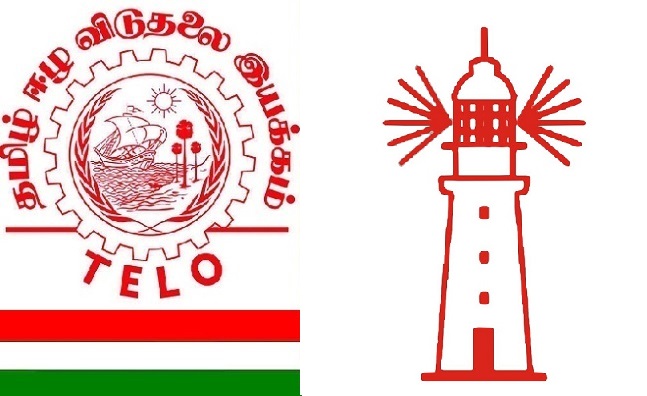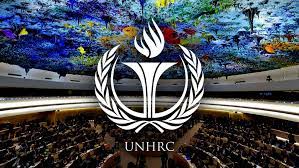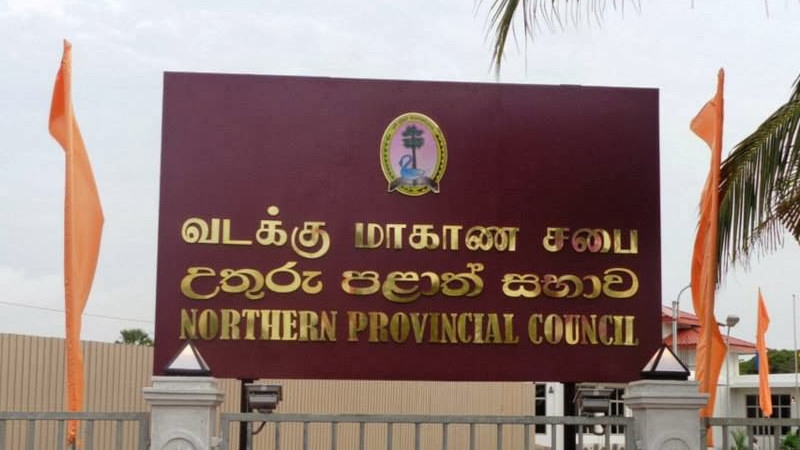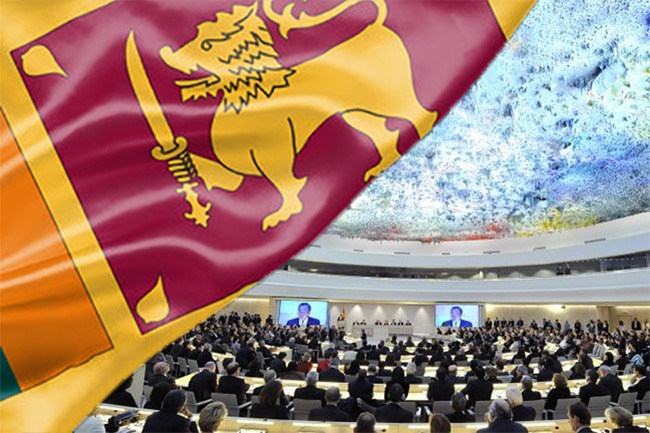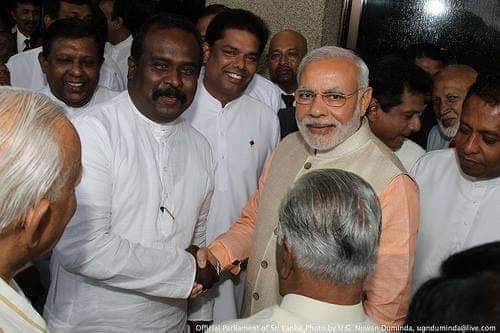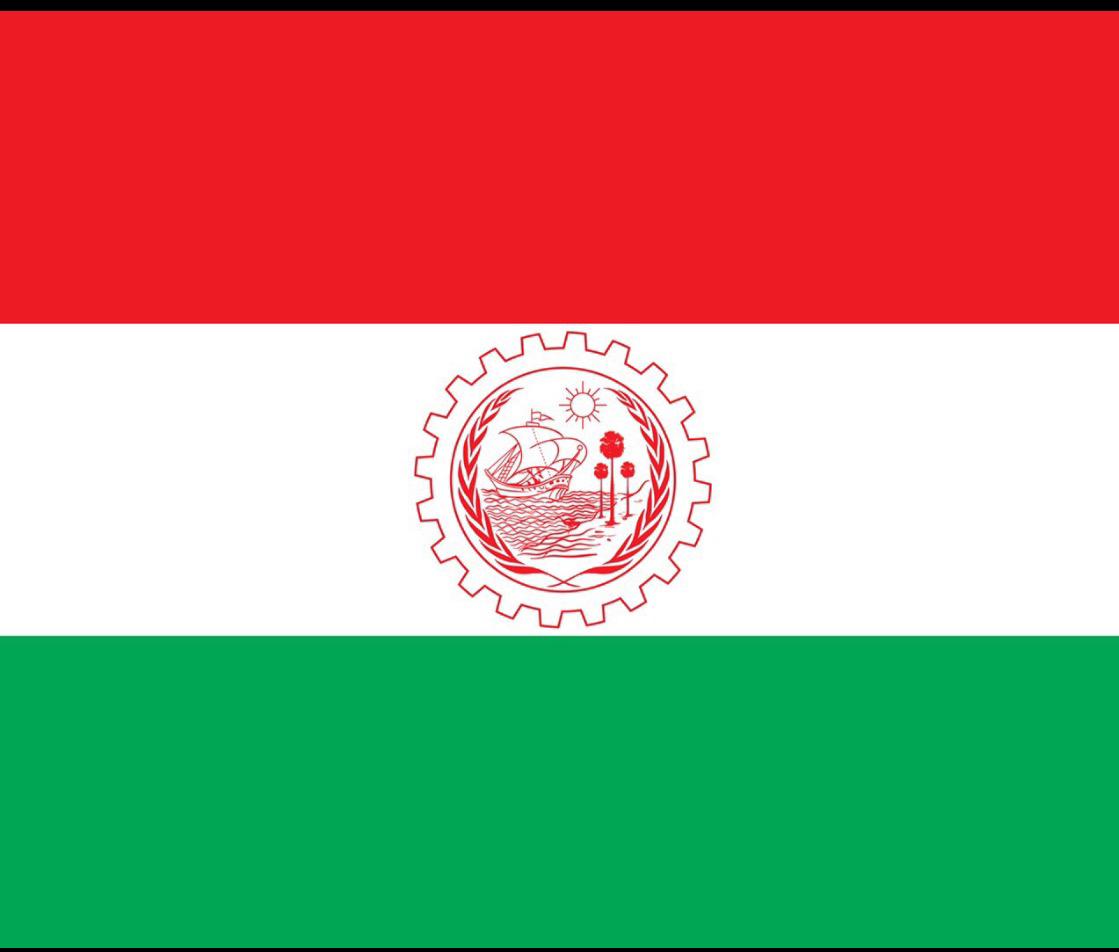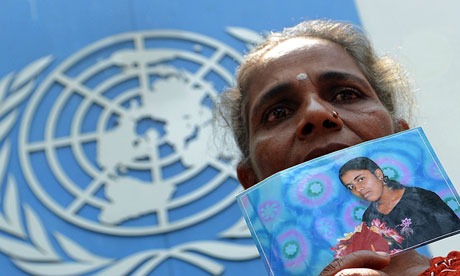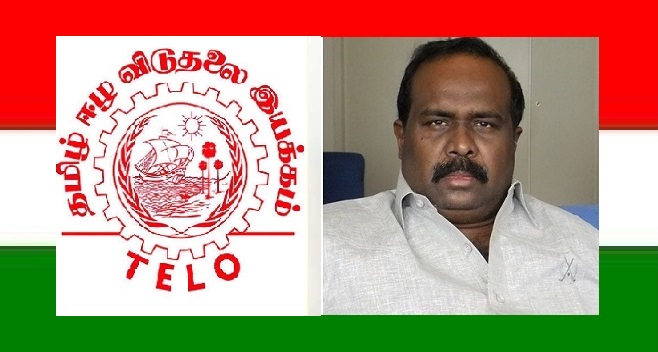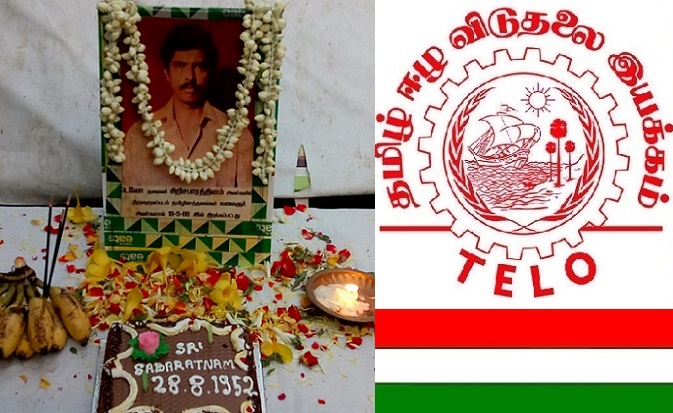We recognise that the Tamil national struggle is not taking place in some Himalayan stratosphere…
At the outset, we would like to emphasise something which all of us amongst the Tamil delegation present here today, recognise and indeed, welcome and accept – and that is, that the circumstance that these discussions are taking place in the Himalayan kingdom of Bhutan is in itself, an open manifestation of the international dimension of the Tamil national question. The Tamil national struggle is not taking place in some Himalayan stratosphere – it is taking place on the ground and in the context of the power balances in the Indian region. We are mindful of this reality and we, for our part, welcome India’s role in bringing about these discussions.
We often say, amongst ourselves, that we are not only Tamils, but that we are also Indians. We are Tamils, we are also Indians and we seek to live in equality and in freedom with our brothers and sisters of India.
And we would like to believe that our Sinhala brothers and sisters too, will in the years to come, begin to recognise the imperative need to learn to live with their brothers and sisters of India before seeking to live with their cousin brothers from somewhat more distant lands.
Not an exercise in skillful advocacy but a search for justice
We would also like to declare at the outset, that we do not regard these discussions at Bhutan as an exercise in skillful advocacy. If it were a matter of skillful advocacy, the Tamils of Sri Lanka would have won their legitimate rights many years ago when the late G.G. Ponnambalam made his eloquent speeches.
Neither do we regard Bhutan as an exercise in political horsedealing. To the Tamil delegation present here, Bhutan is an exercise in search for that which is just and right. And in this, we find strength in the statement of Prime Minister Rajiv Gandhi that a fair and lasting solution must be found to the Tamil national question – a solution that can last for twenty years and more.
It is in this frame, and with this approach, that the Tamil delegation will participate in the talks at Thimpu. We are not here to find an opportunistic and unprincipled settlement as a way of resolving some immediate problem for some person or another. And we would like to believe that the Sri Lankan government has been moved to come to this table for the same reasons and will approach the discussions in the same way.
But what is justice?
Having said that, the question remains: what is justice? Justice is not a mere word. It is not an empty and convenient platitude to be uttered on political platforms and to be written with passion on thin paper. There is a need to give the thick edge of action to that which is written on thin paper.
And when we ask, what is just in relation to the Tamil national question, perhaps, there is a need for us to look at the hard reality that has led to the present impasse. All of us here have some basic knowledge of the facts and therefore there is no need to look searchingly and long at the past.
Oppressed and the oppressor
We look upon these discussions at Thimpu as being concerned with the establishment of that sanctuary where the Tamils in the island of Sri Lanka may live, not only without fear, but also with dignity and self respect. The struggle of the Tamil people for this sanctuary has transformed itself into an armed struggle.
We are not lovers of violence, but we wish to say openly that it is a sanctimonious morality which equates the violence of the oppressor with the violence of the oppressed who seek to escape that oppression. The words of Aurobindo, the sage of Pondicherry, uttered many years ago in 1907, are not without relevance today:
“It is the common habit of established governments and especially those which are themselves oppressors, to brand all violent methods in subject peoples and communities as criminal and wicked… But no nation yet has listened to the cant of the oppressor, when itself put to the test, and the general conscience of humanity approves the refusal… Liberty is the life breath of a nation; and when life is attacked, when it is sought to suppress all chance of breathing by violent pressure, then any and every means of self preservation becomes right and justifiable. It is the nature of the pressure which determines the nature of the resistance.”
Legitimisation of the armed struggle
Our presence here today, on behalf of six Tamil organisations and our participation at these talks with a specially appointed Minister of the Sri Lankan government is a legitimisation of the armed struggle of the Tamil people.
We are concerned here to talk about the way in which this ethnic conflict can be resolved, in a lasting way, and clearly, that is on the basis that the Sri Lankan government accepts that the Tamil delegation present here, represents the Tamils of Sri Lanka.
This is a question to which we may have to come back later, because it seems to us, that if the Sri Lankan government delegation seeks to have talks with all of us at Thimpu, and intends to implement, through the constitutional processes in Sri Lanka, that which is agreed here as the solution to the Tamil national question – then it must follow that the Sri Lankan government recognises the Tamil organisations present here as being the representatives of the Tamil people.
Because, if you do not, then we may need to reconsider the whole question whether we can participate at these discussions at all. That then is the very initial position – a position to which we may have to come back at a later stage.
Basic framework for the talks
It is on the basis of this approach, that we set out at the discussions that we had with you in early July 1985 at Thimpu, that which we regarded as the fundamental framework for our negotiations:
1. the recognition by you of the existence the of the Tamil nation
2. the acceptance by you of the existence of an identified homeland for the Tamils in Ceylon
3. the recognition by you of the right of self determination of the Tamil people, and
4. the recognition by you of the right to citizenship and fundamental rights of all Tamils in Ceylon.
Imperative need to look at the broad concerns of the Tamil people
It was a framework, which we regarded as a useful base for that ‘fruitful exchange’ of views to which Dr. Jayawardene made reference in his written statement of the 12th of August 1985. We do not seek to make this talking process one of making a series of lectures to one another.
Whatever these discussions may lead to and whatever these discussions may end in, it is only through a fruitful exchange of views that any solid basis can be built for the resolution of a conflict which has claimed many lives and which has caused much suffering. The importance that we attach to the framework which we have suggested is that we believe that by an exchange of views concerning the framework, we can clarify, refine and understand what it is that we are talking to each other about.
If we do not share an understanding of what it is that we are talking about, then, we will not ever get to the next stage of examining detailed sections and clauses of enactments and constitutional provisions – because, to get to that stage, there must be, at least, a broad understanding of the essentials of the issues that confront us today.
We do not say for a moment that we can get everything into black and white positions straightaway, but we do say that there is an imperative need to look at the broad concerns of the Tamil people and at that which has moved them to engage in the present struggle.
The existential reality is that the Tamils constitute a nation
Firstly, we say that today the existential reality is that the Tamils of Sri Lanka constitute a nation. And when we say, ‘nation’, we know that the word has often been used in two senses. The Tamil people are not unaware of that usage. In one sense, the word has been used to mean ‘a state’.
But there is another and more fundamental meaning – and that is the sense in which the word refers to the cohesive group identity of a people. A nation is not a mere intellectual concept. It is an idea which reaches out deep into the emotions of a people – and is rooted in their material conditions of existence.
We cannot find understanding here at Thimpu, unless we try to understand these emotions and feelings – emotions and feelings which have led thousands of our most dedicated, brilliant and brave young men to walk out of their homes, to give their lives and even more that, to give of their lives for that which believe to be right – and let us remember that it is sometimes more courageous to live than to die.
We cannot look at the whole process of the Tamil struggle from some rarefied Himalayan peak, whether in Bhutan or elsewhere. We must look at the hard reality as it exists today and that reality is that the Tamils of Sri Lanka, have been educated about their Tamil national identity and that by an test, they constitute a nation.
What is a nation?
We can set out all the analytical definitions of a nation – we have one such definition in the joint written statement made by the Tamil delegation at these talks on the 13th of August 1985.
A nation is a historically constituted stable community of people formed on the basis of a common language, territory, economic life and psychological make up manifested in a common culture.
But, at the end of the day, it may well be that the words of Rupert Emerson will carry conviction, through their very simplicity:
‘The simplest statement that can be made about a nation is that it is a body of people who feel that they are a nation; and it may be that when all the fine spun analysis is concluded, this will be the ultimate statement as well’.
And many years ago, Achmed Sukarno remarked- ‘But what is a nation? Many great thinkers have applied their minds to this…One of the truest and most moving descriptions I know was given by a little known professor of Ohio University. About forty years ago Professor Taylor wrote: “Where and what is a nation? Is there such a thing? You would answer that the nation exists only in the minds and hearts of men. It is an idea. It is therefore more real than its courts and armies; more real that you and I are, for it existed in our fathers and will exist in our children. It is an idea, it is an imagination..”
And today, the Tamil nation is more real than the courts and armies ranged against it, because it exists in the hearts and minds of hundreds of thousands of Tamils, young and old, living in many lands and across distant seas.
The togetherness of the Tamil people
The togetherness of the Tamils in the island of Sri Lanka springs from a common culture, a common language and a common heritage. But it is not a function of the past alone.
It is a togetherness which has been pressed into shape by the shared discrimination of the present. Because that which is separately treated becomes separate.
It is also a togetherness which has been given strength and direction by a growing resolve and a growing determination that we as a people will mould a future where our children and our children’s children may grow to the fullness of their potential and where they may live in equality and in freedom.
We are not chauvinists…
But we are not chauvinists. We do not take an exaggerated view of nationalism. We know that the growth of nationalism in the Indian region is a natural and inevitable one.
We have seen the growth of Sinhala nationalism and we do not decry it. It is only when it takes exaggerated forms and becomes chauvinistic that problems are created.
We know that in the end, national freedom can only be secured by a voluntary pooling of sovereignties, in a regional, and ultimately in a world context. And we recognise that our future lies with the peoples of the Indian region and the path of a greater and a larger Indian union is the direction of that future.
It is a union that will reflect the compelling and inevitable need for a common market and a common defence and foreign policy and which will be rooted in the common heritage that we share with our brothers and sisters of not only of Tamil Nadu but also of India as a whole.
It is a shared heritage that we freely acknowledge and it is a shared heritage from which we derive strength – and we know that we too, as a people, can at the same time, contribute to that strength.
We speak at Thimpu, for the Tamil nation or not at all
And, so we say here at Thimpu, that there is no way in which any step forward can be taken today, except on the basis that the Tamils of Sri Lanka constitute a nation.
We would, very humbly, say this to the Sri Lankan government delegation.
If they take the view that a sufficient number of Tamils have not yet died, if they take the view that a sufficient number of Tamils have not yet suffered, to establish that the Tamils of Sri Lanka, constitute a people, that they constitute a nation, then, so be it.
It will not be because the Sri Lankan government had not been told that that was the reality.
We have said this before to the international community and we say it again, here at Thimpu, we do not plead for justice. We do not beg for fairness. We know that justice will prevail in the end – and we have confidence and faith in that process.
But we do seek to engage you, in that fruitful exchange of views, so that you may come to understand the reality that confronts both you and us – that we, too, are a people. Please understand that this is no abstract theory. This is no abstract principle. It is the existential reality of a certain consciousness of the Tamils in the island of Sri Lanka – a consciousness that has been shaped in the crucible of a continuing struggle.
We say, very respectfully, and without rancour, please understand that we too are a people and please deal with us on that basis, or not at all.
We, for our part, wish to make it clear to you, that we speak at Thimpu on behalf of the Tamil people or not at all.
We do not speak for ourselves. And please do not give us the niceties of legal interpretations. Please tell us straight: do you regard as a people or not? If not, say so and we will go away because we regard that as being fundamental to the whole process of talking with you.
We must know who it is that you say that you are talking with – do you say as you have said in your written statement of the 12th of August 1985, that you are talking with some ‘six groups’ who represent some other ‘Tamil groups’ in Sri Lanka? If that be the case, then we do not believe that we have any place here.
But if you say that we represent the Tamil people, then that is something else again. We are here, because we seek to engage you in the serious business of talking about the problems that have arisen between the Sinhala people and the Tamil people.
We are a reasonable people. And that is why, as a reasonable people, we say at the beginning, please tell us, with whom do you say you are talking with? That is why, as a reasonable people, we have sought to explain to you, why it is that we say that we are a people – why it is that we say that the Tamils in the island of Sri Lanka constitute a nation.
Identified homeland
And, so we go on to the second matter that we have set out as a part of the basic framework for our discussions at Thimpu – and that is the question of an identified homeland.
We say that we have an identifiable homeland in the North and East of Sri Lanka. We do not seek to enter into some sort of historical debate about whether the Tamils of Sri Lanka have lived in the North and East from the dawn of history – although many of us believe that the historical records support this conclusion.
But let us not get involved in a secondary school debate. Neither you nor we are in a position to do that today.
A point was made by a member of the Tamil delegation yesterday and it was a point that was movingly made. He asked: ‘where do we go for safety, when we are assaulted in the South of Sri Lanka? Where does the government of Sri Lanka send us when there are riots in Colombo? We seek sanctuary in our homeland in the North and East of Sri Lanka.’
That surely must be the best test of all, because we all know where we go – and so we say, once again, very respectfully, please do not seek hide that which is a self evident truth, please do not deny the existence of our homelands.
Recognised by Sri Lanka in pacts, agreements and constitutions
After all the fact is that the Bandaranaike – Chelvanayagam Pact of 1956 recognised that the North and East of Sri Lanka should be treated differently in relation to language, land settlement and son, because the Tamil people lived there.
The fact is that the Dudley Senanayake – Chelvanayagam agreement of 1965 made special provisions concerning the North and East because the Tamil people lived there.
The fact is that the 1972 Sri Lankan Constitution made special provisions concerning the use of the Tamil language in the North and East, because the Tamil people lived there – permanently – permanent Constitutional provisions were not made in respect of a transient population.
And the fact is that the 1978 Sri Lankan Constitution not only declared Tamil as a national language, but also made special provisions for the use of this ‘national’ language in the North and East, clearly because the Tamil people lived in the North and East, not as wandering nomads, but permanently in an area which they regarded and the Sri Lankan government accepted as their homeland.
Without a homeland we could not have become a people and without a homeland we shall cease to be a people
And, so we ask the Sri Lankan government delegation, here at Thimpu, do you accept that which we are saying as being right? Do you see the justice of our claim to an identified homeland?
Do you not see that without an identified homeland, we could not have become a people with a separate language and a separate culture, and that without an identified homeland we shall cease to be a people?
Or is it the position that the Sri Lankan government does in fact see this reality and for that reason, refuses to recognise here at Thimpu, the existence of a homeland for the Tamil people, so that it may absorb the Tamil people into a single homogeneous ‘Sinhala’ nation?
Please tell us, if that which we say does not seem reasonable to you. We are a reasonable people and we will listen to you, if you show us where we are wrong.
But, if you cannot tell us where we are wrong, and if you seek to assert that you are not persuaded, then, surely, the struggle must go on. We do not have any other option. If we were to say, that even though something was not right, even though something was not just, we shall enter into a political horsedeal – that would be unreasonable – and we are a reasonable people.
We do not seek political horsedeals
And over the years, we as a people, have had a rich experience of political horsedeals that have not worked. We have found that every such agreement or pact has not been honoured.
We do not say that they were not honoured because the men who were concerned were evil men. We do not say that. They were subject, they said, to pressures from their Sinhala electorate. It is an old story which the Tamil people have learnt well.
After all we are a people, not without wisdom. It is a story where competing Sinhala political parties in Sri Lanka, have had recourse to an exaggerated Sinhala nationalism either as a way of achieving power or as a way of perpetuating their hold on power.
The real question is: what is it that the Sinhala people want?
The real question is: what is it that the Sinhala people want? Are the Sinhala people willing and ready to recognise the Tamils as a people and sit with them as equals, I repeat as equals, and structure a polity for a multinational state?
That is the straightforward question which the Sri Lankan government delegation must answer. If you cannot do that, then all these talks will amount to nothing but an empty charade devoid of meaning or content.
We have had serious reservations about these talks
May we say, with frankness, that we have had serious reservations at every stage of these talks. We have had serious reservations about the strength of the Sri Lankan government to agree to that which is just.
We have had serious reservations about the implementation of that which may eventually be agreed upon. We have had serious reservations about the way in which anything can be secured.
We are gravely concerned with the basic principles that the Sri Lankan government has put forward at this table – for just as much as we have placed four basic principles – it would seem that principles are not the special preserve of the Tamil delegation – they seem to attract the Sri Lankan government delegation as well.
Without a referendum, can power be shared between the centre and the provinces ?
The Sri Lankan government has stated here that whatever is decided upon here must be on the basis that the decisions will not involve the holding of a referendum to amend the Sri Lankan constitution.
As a reasonable people, this basic ‘principle’ of the Sri Lankan government causes some grave concern.
For, one thing, Prime Minister Rajiv Gandhi has publicly stated that a settlement on the lines of the powers given to states like Tamil Nadu in the Indian Constitution may have to be considered.
But the Sri Lankan constitution expressly provides that Sri Lanka shall be an unitary state and this provision cannot be amended except through a referendum.
In the result, a settlement on the lines indicated by Prime Minister Rajiv Gandhi, where power is shared between the centre and the provinces, may not be achieved, given the basic ‘principle’ enunciated by the Sri Lankan Government delegation at Thimpu.
Are you afraid to face the Sinhala people with that which is agreed at Thimpu?
Again, when it is said that there shall be no referendum, what does it really mean? Does it mean that you are afraid to put that which is agreed at Thimpu, to the Sinhala people?
And if it means that you are afraid to put the agreed solution to the Sinhala people now, then please tell us: how long do you expect such a solution to last?
We are not here to strike an opportunistic ‘deal’ at Thimpu, behind the backs of the Sinhala people – to reiterate the words of Prime Minister Rajiv Gandhi, we are here to find a just and lasting solution – a solution that can last for twenty years and more.
We believe that that type of solution must secure, today, the open and wholehearted acceptance of the broad spectrum of Sinhala opinion – otherwise, the settlement will suffer the same fate as the agreements of 1957 and 1965. Too many Tamils have died for us to be engaged in that sort of process. And so we say that we have some very grave concerns about the approach of the Sri Lankan government delegation to these talks.
Please tell us if that which we say is not reasonable
If you say that something that we say does not appear to be just, please tell us. We are a reasonable people – and we will listen.
But we are not willing to be told: ‘You say all this – but let us get on with an examination of detailed sections and so on without examining the basic framework’.
There is no way in which you can persuade us to adopt that course of action. Because, it is the path of reason alone that allows a fruitful exchange of views and we have come to Thimpu for that fruitful exchange of views.
The right of self determination and the way that we may choose to exercise that right
And, so let us turn to the third basic feature of the framework suggested by us – and that is the right of self determination.
We say that we are a people and we say that we have earned the right of self determination. Please permit us to clarify our position. One is the right of self determination. The other is the way in which we may choose to exercise that right. The two are different and the importance of the difference arises in this way.
If you agree that we have the right of self determination, if you agree that we, as a people, have the right to choose our political status, then since both you and we have the right to choose, we can sit together as equals and talk about the way we propose to exercise our right.
But we are not prepared to sit and talk to each other on the basis that one is the master and the other is the servant, that one is the ruler and the other is the ruled. That is not the basis on which we can participate at discussions, whether at Thimpu or elsewhere.
We say: ‘yes, we are a reasonable people and as a people, we will sit and talk with you. You have the right to choose, just as much as we have the right to choose – no less and no more’. From that dialogue, amongst equals, we know that the rationalities will prevail. But if you say: ‘no, we are the rulers and you are the ruled’, then we have not even got to first base in the process of dialogue.
The inherent right of a subjugated people to free themselves from an alien subjugation
We say that the Tamil people have earned the right to self determination – and why do we say that? As a reasonable people we want to explain to you why we say that. We know that although Article 1 of the International Covenant of Civil and Political Rights, to which Sri Lanka is a signatory, proclaims that every people have the right to self determination, the United Nations Charter and all International instruments recognise the territorial integrity of existing states. The Tamil people know that – they have looked into all that. We are a people, not without some wisdom.
We also know that as in the case of the colonies that Dr. Jayawardene referred to in the course of these proceedings, the territorial integrity of existing states has in certain circumstances been overridden.
In what circumstances was the concept of territorial sovereignty overridden in the law of nations?
The Tamil delegation here at Thimpu asserts a proposition founded on common sense and justice – and in the ultimate analysis all sound law is common sense and justice. It is a very uncomplicated business, this question of international law. It is simple.
And the simple proposition is this: ‘A people who are subjugated by an alien people have the inherent right to free themselves from such alien subjugation’. And it is this right which is the right of self determination – a right which has today, become a peremptory norm of general international law.
We will tell you why we say that we are a subjugated people
The Tamils in the island of Sri Lanka are not only a people, but by an test, we are today, a subjugated people. Why do we say that we are a subjugated people?
Again, as a reasonable people, we wish to tell you why we say that we are a subjugated people – we feel that it is our duty to explain to you our position so that you may understand and so that we may engage you in that ‘fruitful exchange’ of views that Dr. Jayawardene spoke about.
Disenfranchisement was an act of subjugation
In 1948, soon after independence from British rule, one of the first steps of the Sinhala government, was to utilise the frame afforded by an unitary constitution to introduce legislation which deprived almost one half of the Tamils of Sri Lanka, who worked on plantations, of their citizenship and their right to vote.
These laws were enacted despite the fact that a pan Sinhala Board of Ministers had, in 1943, prior to independence, proposed to the British government, a parliament for independent Sri Lanka, of 101 seats of which 14 seats were allocated for plantation Tamils.
Further, although the plantation Tamils were disenfranchised, their numbers were nevertheless taken into account for the purposes of delimitation. The Sinhala majority was, in effect, given weightage in representation in the legislature, at the expense of the Tamil minority.
And so, we say, here at Thimpu, that the deprivation of a then existing right to citizenship of one’s country for a people, all of whom were born there and who had lived there all their lives was an act intended to subjugate the Tamils of Sri Lanka and bend them to the will of a permanent Sinhala majority, within the confines of an unitary constitution.
State colonisation of Tamil homeland was an act of subjugation
Again, during the period from 1936 onwards, when land alienation and settlement was in the hands of Sinhala Ministers, systematic state aided colonisation deprived the Tamils of their traditional homelands in the eastern parts of the island.
In the Trincomalee district, in 1921, a mere 3% of population were Sinhalese: by 1946 their numbers had increased to 20% and in 1971 to almost 29%. Again in Batticaloa and Amparai, in 1921, 4.5% of the population were Sinhalese: by 1971 their numbers had increased to almost 18%. An independent observer such as Virginia Leary has commented:
“…Tamils have objected to State colonisation schemes which import large numbers of Sinhalese into traditional Tamil areas. The Tamil concern about colonisation is related to insecurity about their physical safety and to fears that Tamils will become a minority in their traditional homelands.
The government maintains that since Sri Lanka is a single country citizens may freely move into any part of the country and that it is necessary to transplant some populations to more productive areas. The Tamils answer that they are not opposed to individual migration but only to large scale government colonisation schemes which change the ethnic composition of an area…”
We say that large scale colonisation schemes of successive Sinhala governments were intended to change the ethnic composition of the traditional homelands of the Tamil people and to further the process of subjugating Tamil people by making them a minority in their own homelands.
The enactment of the Sinhala only law was an act of subjugation
Again in 1956, a Sinhala government enacted that Sinhalese shall be the sole official language. This was done although, in 1944, before independence, the legislature had enacted that both Sinhala and Tamil should be official languages.
The deliberate ‘downgrading’ of the Tamil language was more than a symbolic insult – it was intended to eventually erase the separate cultural identity of the Tamil nation in Sri Lanka. It also served to deprive thousands of Tamils of employment in the public sector. It was yet another step in the subjugation of the Tamils of Sri Lanka to the will of the Sinhala majority.
Standardisation of admissions to universities was an act of subjugation
In 1971, the Sinhala government standardised admissions to the University and effectively reduced the number of Tamil students entering Universities in Sri Lanka.
The percentage of Tamil students entering engineering courses fell from 40% in 1970 to 13% in 1976; in science faculties the percentage fell from 35% in 1970 to 15% in 1978; and in the medical faculty from 50% in 1970 to 20% in 1975. And nothing aroused deeper despair among Tamils than the feeling that they were being systematically squeezed out of higher education.
And we have asked: what wrong have we done?
And so today, Tamils have asked themselves, what wrong have we done. Was it wrong for us to protest against the disenfranchisement of the plantation Tamils? Was it wrong for us to protest against the Sinhala only Act and say that this was a breach of the promise made by the pan Sinhala cabinet in 1944 that both Sinhala and Tamil would be the official languages of Sri Lanka? Was it wrong for us to protest against the standardisation of admissions to Universities? Was it wrong for us to say that the lands in which we live are not as fertile as the lands in which you live in the South and in the West, and that it was unjust to ‘standardise’ University admissions when there was no standardisation in so far as economic resources was concerned? Was it the position that what the Sinhala people have, they continue to have – and, what we have, they ‘standardise’? Was that right or wrong?
We say all this, please, not in a spirit of debate. Please. The stage is far too important and critical for that – we are today at a watershed and we all recognise that – and post mortems are useful only to the extent that they are needed to understand that which is an existential reality today.
Refusal to share power within a federal constitution was itself an act subjugation
Again, the polls victory of the Federal Party in 1956, a party which was committed to securing a federal constitution for Sri Lanka and ‘the establishment of one or more linguistic states incorporating all geographically contiguous areas in which the Tamil speaking people are numerically in a majority as federating units enjoying the widest autonomous and residuary powers, consistent with the unity and external security of Ceylon’, marked the coming into being of the Tamil nation in Sri Lanka – a nation constituted of the Tamils living in their traditional homelands in the North and East of Sri Lanka.
The demand for a federal constitution was the legitimate expression of the right of self determination of the Tamil people at that stage. But it was a demand that was refused. Why was it refused? And was that refusal right or wrong?
These are questions which we must ask if we are to face up to the reality as it exists today. Because, we say that the refusal of successive Sinhala governments to share power within the frame of a federal constitutional structure was itself an act intended to subjugate the Tamils of Sri Lanka.
The continued failure of the Sri Lankan government to offer a political solution which recognises the existence of the Tamil nation and which allows for the sharing of power with that Tamil nation, suggests that it seeks to annihilate and absorb the Tamils of Sri Lanka into a single homogeneous Sinhala nation, albeit under the cloak of a so called ‘Sri Lankan nationality.’
May we say, that we would like to be persuaded otherwise – but as always, it would seem that deeds are usually more persuasive than words. And, so, we say that as a subjugated people, we have earned the right to choose, we have earned the right of self determination.
Fundamental human rights
And, on the fourth matter of the right to citizenship and the exercise of fundamental rights, permit us to say that which the independent Minority Rights Group whose sponsors include Lady Butler, Robert Gardiner, Jo Grimond and Gunmar Myrdal, stated in September 1983:
“…the present conflict had transcended the issue of special consideration of minority rights and has reached the point where the basic human rights of the Tamil community – the rights to life and property, freedom of speech and self expression and freedom from arbitrary arrest have in fact and in law been subject to gross and continued violations…”
It is said that fundamental human rights are those rights which spring from the dignity of man and the Tamils in the island of Sri Lanka seek to live with dignity with their fellowmen.
Please recognise the significance and the importance of the framework suggested by us
Please do not believe that you can get any lasting solution to the problems that we face, by sweeping all this under the carpet. That is why, it is necessary for us to talk with you about the basic framework that we have suggested for these discussions at Thimpu.
I would say this to the Sri Lankan government delegation. Please recognise the significance and the importance of the matters that we have raised today. Please tell us with whom you wish to talk – please tell us with whom you say you are talking with.
Because this is a matter of immediate concern to every member of the Tamil delegation here – specially because of your reference to us as some ‘groups’ in your written statement of 12th of August 1985. A statement, which we find has been released to the press in Sri Lanka.
We cannot talk under threats: we cannot be pressured into ‘justice’
The Thimpu talks were originally intended as secret talks, but today, these talks must be one of the most publicised secrets in the world. The purpose of the secrecy was clearly to prevent posturing at this table.
We did not want this forum to be used, by all sides, as a way of creating additional confusion. It was the intention to examine the problems that had arisen in a calm and collected manner.
But recent statements on behalf of the Sri Lankan government in Colombo have not helped the talking process. Because we cannot talk under threats – from either side.
We cannot have threats about 10,000 persons being armed by the Sri Lankan government. We cannot have threats in the international press that if the talks fail then the Sri Lankan government would ask Prime Minister Rajiv Gandhi to take action against militant Tamil organisations in Tamil Nadu.
If you want to move your international forces, please go ahead – because we, too, believe that we have some understanding of those forces, perhaps a better understanding than you. We are here to find a just answer – and it is about justice that we seek to talk to you about. But we cannot be pressured into justice.
We, too, are a people – and we are a reasonable people
We are a reasonable people. And we say this bluntly. What will reason show? Let reason show that here were a Tamil people who were ready to talk as a people, but that they were met by a Sri Lankan government which refused to talk to them as a people.
Please do not equivocate on this matter. Please do not believe that the Tamils in the island of Sri Lanka can be annihilated. Please do not believe that. Please do not believe that you can manage and subjugate the Tamils in the island of Sri Lanka through stooges who depend for their power on the patronage of the ruler.
Please understand why we say this – we are not here to win a debating point. We know that that sort of debate is sterile, it does not get us anywhere. But if you are willing to engage in a ‘fruitful exchange’ of views, then certainly, let us talk about the basic framework that we have suggested for our discussions.
And that fruitful exchange of views is the path of understanding and we repeat, it is only on the basis of understanding that something can be built – otherwise we will be dealing with pieces of paper and that will not take us anywhere.
Thousands of Tamils, young and old, men and women, and children as well, have died and suffered so that we, may stand up at Thimpu and declare, ‘yes, we too, are a people and we will sit and talk with you, on behalf of the Tamil nation, or not at all’.


